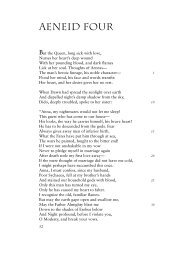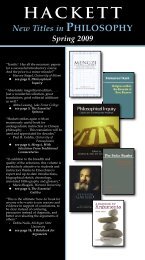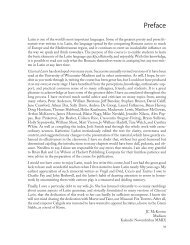Study and Discussion Questions for Early Buddhist Discourses
Study and Discussion Questions for Early Buddhist Discourses
Study and Discussion Questions for Early Buddhist Discourses
- No tags were found...
You also want an ePaper? Increase the reach of your titles
YUMPU automatically turns print PDFs into web optimized ePapers that Google loves.
<strong>Discussion</strong> <strong>Questions</strong>1) <strong>Early</strong> Buddhism emphasizes that sensual pleasures are “obstructions” to living a religious <strong>and</strong>happy life. Is it reasonable to hold such a negative view of sensual pleasures (after all,most people act as if sensual pleasures are among life’s greatest joys)?2) What, if anything, is more valuable to a human life than sensual pleasures? If human beingsare no more than the complex animals that evolutionary biology suggests they are, is itnot reasonable to identify human “good” with the sensual pleasures that serve as guiding<strong>for</strong>ces in human biology?3) What does the parable of the raft imply about the status of the dhamma? Does the parablepurport to show that the dhamma is an instrumental, rather than an absolute, truth? Is thedhamma, like the raft, something to be ab<strong>and</strong>oned after reaching enlightenment? Is thedhamma itself ab<strong>and</strong>oned (as some say that an enlightened life is “beyond good <strong>and</strong> evil”<strong>and</strong> thus beyond all teachings) or is it only the selfish attachment to the dhamma that isab<strong>and</strong>oned (but one remains living in accord with the principles of the dhamma)?4) Does the parable of the raft suggest a significant difference between the way <strong>Buddhist</strong>s regardthe teachings of the Buddha <strong>and</strong> the way members of other religions regard the centraldoctrines of their religion?5) Why do people want to believe in a permanent Self?6) Is not the Buddha’s no-permanent-self doctrine likely to cause anxiety <strong>and</strong> pessimism in hisfollowers as they realize that such a doctrine flirts closely with the possibility of death asa total annihilation of the person? How can a <strong>Buddhist</strong> avoid nihilism as a result of theno-permanent-self doctrine (in fact, the Buddha himself relates in this discourse that hehas been accused of nihilism)?7) The Buddha thinks that dependence on speculative metaphysical views gives rise to sorrow,depression <strong>and</strong> despair. But is it not just the opposite, that without such beliefs there isnothing to hope <strong>for</strong> (hence the attraction of highly metaphysical systems of belief likeChristianity, Hinduism <strong>and</strong> Platonism)? For example, is it not better to believe the moreoptimistic view that there is a permanent self or soul that lives on—even though theremay be little empirical evidence <strong>for</strong> such a view—than to be a hard-headed empiricistlike the Buddha <strong>and</strong> perhaps fall into pessimism <strong>and</strong> nihilism?8) This discourse contains the Buddha’s specific arguments against the belief in a permanent Selfthat were raised in Chapter Seven. See the discussion questions keyed to the Discourseto the First Five Disciples.9) Is eliminating or ab<strong>and</strong>oning the six sense faculties <strong>and</strong> their objects a reasonable religiousgoal? How does such a process compare or contrast with the practices of other religioustraditions?









